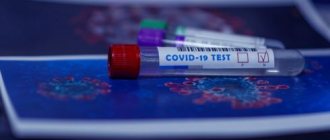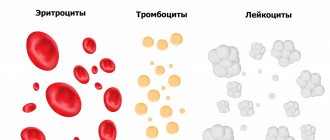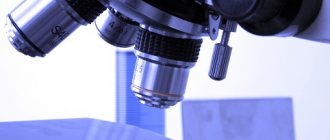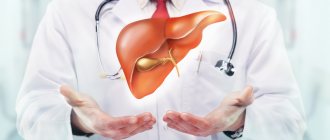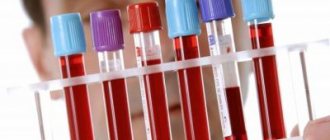Detailed description of the study
Many infectious and non-infectious diseases can be suspected even before the appearance of pronounced clinical symptoms. Then diseases can be prevented by taking preventive measures, or identified and started therapy: the sooner the better. A general blood test makes it possible to assess the patient’s health status, therefore it is used as a screening diagnostic method. This study is important for monitoring the progress of pregnancy, when the doctor monitors the well-being of two organisms, and not one.
The analysis includes three studies:
- Complete blood count (CBC);
- Determination of erythrocyte sedimentation rate (ESR);
- Leukocyte formula.
Full list of hematological parameters determined during the study:
- Red blood cell count;
- Leukocyte count;
- Platelet count;
- Amount of hemoglobin;
- Hematocrit;
- Average hemoglobin content in a red blood cell;
- Color index;
- Average erythrocyte volume;
- Average hemoglobin concentration in a red blood cell;
- Leukocyte formula, types of leukocytes with counting;
- Erythrocyte sedimentation rate.
These indicators make it possible to determine the presence of inflammation or infection, anemia, and also detect some other pathological processes. A diagnosis cannot be made from this test alone, but the findings are a great starting point to confirm that a person is healthy. Otherwise, for further diagnostics.
Analysis deadlines
The rhythm of life in a modern city dictates its conditions to us. Everyone dreams of living the coming day, making the most of it, without wasting a minute. Our company will help you stay in this fast-paced rhythm of the metropolis.
Most routine studies are performed automatically on special instruments - analyzers. Depending on the study, the time during which the device produces results ranges from 1 minute to 1 hour. That is why our Laboratory completes most tests within 1 business day. However, we conduct some studies over 2-6 days or more. Why is this happening?
- When you come to the CITILAB medical center to take tests, your biomaterial (for example, blood) is not examined on site, but is sent in prepared form in special temperature-controlled containers to one of our laboratory complexes. The courier service tries every day to deliver biomaterial to the Laboratory as quickly as possible; for this we use both road and air delivery and their combinations.
- In laboratory diagnostics, there are many techniques that are used when performing one or another type of research. For example, the bacteriological culture method allows studies to be carried out within 2-6 days. Such timing is due to the fact that this method is a study in which a biomaterial, with pathogenic microorganisms likely to be found in it, is placed in an environment favorable for their reproduction under certain temperature conditions. Then, over the course of several days (the timing depends on the pathogen being identified), microorganisms grow in the form of so-called colonies. Therefore, longer periods than 1 business day are required to complete this test.
- To perform some complex and rare tests, our Laboratory seeks help from the best, highly specialized and specialized organizations in the laboratory diagnostic services market. This allows us to achieve the most accurate results, but increases the time it takes to complete the study.
- CITILAB is a socially oriented company. We want the possibilities of the medicine of the future to be available to as many people as possible in various regions of Russia. In cases where certain tests are not of great clinical demand, we try to collect the largest possible amount of biomaterial during the day in order to optimize the costs of reagents and analyzer operation. In a sense, we have to “sacrifice” the timing of the analysis, but these steps turn out to be economically and socially justified, since in the end we are able to reduce the final cost of the study as much as possible.
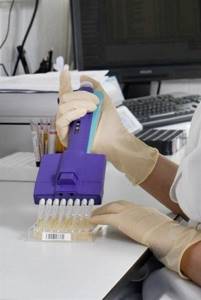
The fastest way to obtain information about the results of a completed study is to check the readiness of the analysis through our website. All data about you and the necessary examination is stored in a special Laboratory Information System, which is connected to all branches of our Laboratory. As soon as your test results are ready, they appear on our website, where you can view them yourself. If you want to receive the classic paper version, you need to contact the medical center where the test was taken. Also in our Laboratory there is a service of analyzes in the “Urgent” mode, which we are ready to perform within 2-5 hours. However, such a service is possible only in those medical centers that are located in close proximity to the Laboratories themselves (Moscow, St. Petersburg, Samara, Novosibirsk), from where the biomaterial can be delivered to the laboratory doctor as quickly as possible.
We are building an open company and working for you - our clients. After all, our Laboratory was created precisely for you. It develops in accordance with your requests, needs and expectations. We hope that this information will help you understand the features of our work even better.
Important Notes
Material for research
children under 7 years of age: venous blood/capillary blood (for special indications) children over 7 years of age and adults: venous blood Taking capillary blood for research is carried out only for children under 7 years of age (for special indications)! According to GOST R 53079.4-2008, indications for taking capillary blood are possible: in newborns, in patients with very small or hard-to-reach veins, with large-area burns, and severe obesity of the patient.
Blood chemistry
Blood chemistry
gives the most complete picture of the functioning of all human organs and systems, as well as the speed of metabolic processes occurring in his body. It is recommended to conduct a biochemical blood test annually. The biomaterial for research is taken from a vein in an amount of no more than 5 ml and distributed into several test tubes. Blood sampling is performed exclusively in the morning. Before analysis it is necessary to prepare:
Sign up for blood tests
Make an appointment
When is a repeat test for coronavirus done?
To obtain reliable results, it is recommended to take a repeat PCR test for COVID-19 after 10 days. The study is then repeated until the analysis shows 2 negative answers in a row. During the testing period, the patient must be in self-isolation and have minimal contact with others.
A repeat test for IgM and IgG antibodies in asymptomatic cases of the disease is recommended after 7 days.
Cost of services
| Name of service | Price, rub.) | Discount |
| (1 k.d.) CORONAVIRUS COVID-19 (SARS-Cov-2), determination of RNA (quality) with collection of biomaterial | 2000 | |
| (CITO 12 hours) NEW CORONAVIRUS COVID-19 (SARS-Cov-2), determination of RNA (quality) with collection of biomaterial | 3500 | |
| CORONAVIRUS COVID-19, PCR, in English with collection of biomaterial | 2250 | |
| (1 k.d.) Antibodies of the IgA class to the coronavirus COVID-19 (Anti-SARS-CoV-2 IgA), semi-quantitative determination, enzyme-linked immunosorbent assay method with sampling of biomaterial | 1150 | |
| (1 k.d.) Antibodies of the IgM class to the coronavirus COVID-19 (Anti-SARS-CoV-2 IgM), semi-quantitative determination with sampling of biomaterial | 1100 | |
| (1 k.d.) IgG antibodies to COVID-19 coronavirus (Anti-SARS-CoV-2 IgG), semi-quantitative determination with biomaterial sampling | 1100 | |
| (1 k.d.) Antibodies of the IgM/IgG class to the coronavirus COVID-19 (Anti-SARS-CoV-2 IgM/IgG), semi-quantitative complex determination, enzyme-linked immunosorbent assay method with biomaterial sampling | 2000 | |
| (2 k.d.) IgA/IgG class antibodies to the COVID-19 coronavirus (Anti-SARS-CoV-2 IgA/IgG), semi-quantitative complex determination, enzyme-linked immunosorbent assay method with biomaterial sampling | 2200 | |
| (2 k.d.) Complex immunity - determination of IgG antibodies to the full-length S protein and to the N nucleoprotein for the COVID-19 coronavirus, semi-quantitative determination with the collection of biomaterial | 2500 | |
| Complex immunity - determination of IgG antibodies to the full-length S protein and to the N nucleoprotein for the COVID-19 coronavirus, field test with collection of biomaterial | 2200 | |
| Differential diagnosis of ARVI, Influenza A and B, coronavirus COVID-2019 (Sars-Cov-2) with collection of biomaterial | 2950 |
A test to detect immunoglobulins is recommended in the following situations:
- carrying out additional diagnostics in the acute phase of the disease or in the absence of the possibility of taking a smear;
- to identify individuals who have had an asymptomatic infection;
- to detect the response of the immune system to a previous disease when examining patients at risk;
- to conduct mass diagnostics of the population, allowing to determine the level of population immunity;
- to select individuals who can become immunocompetent plasma donors.
How is the diagnosis carried out?
To detect antibodies to the causative agent of coronavirus infection, enzyme-linked immunosorbent assay (ELISA), immunochemiluminescent (ICL) and immunochromatographic methods are used. In our medical center, diagnosis is carried out using the ELISA method. The MedAstrum Clinic offers the use of an enzyme-linked immunosorbent test system, which has high accuracy, specificity and sensitivity (up to 98%).
At the MedAstrum clinic, all rules of the sanitary and epidemiological regime are observed; you must visit the medical center wearing a mask and gloves. The patient must have a passport with him.
Coagulogram (hemostasiogram) or blood test
A coagulogram (hemostasiogram) or blood clotting test helps determine the quantity and quality of prothrombins, as well as their ability to form blood clots and prevent serious blood loss, as evidenced by the rate of formation of blood clots. If clotting rates are reduced, then there is a possibility of extensive bleeding even with minor injuries, which, in turn, can lead to serious health problems. Excessive blood clotting (increased thickness) can lead to the formation of blood clots that can block the most important vessels and arteries. Most often, a coagulogram is prescribed before surgery, for the diagnosis and treatment of thrombosis, during planning of pregnancy or its pathologies, for diseases of the hematopoietic organs, bleeding, diseases of the liver and cardiovascular system. To obtain reliable parameters for this type of study, the patient must follow some rules:
Blood is drawn from a vein in the morning. Before the procedure, you can drink a glass of plain water without carbon.
